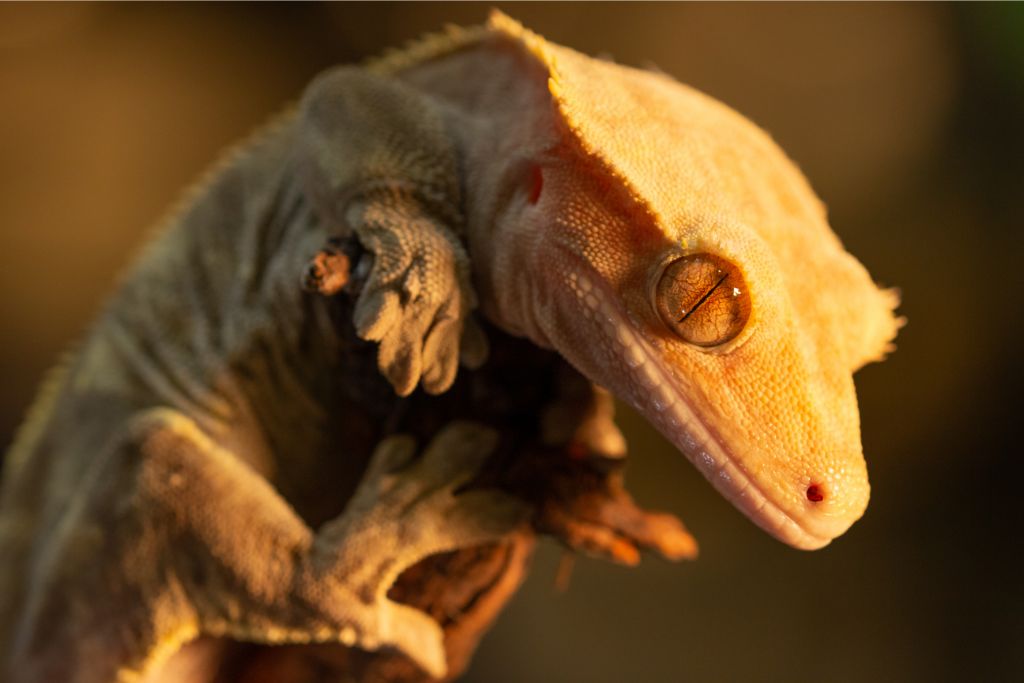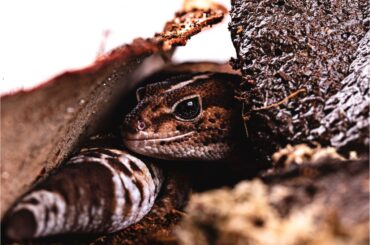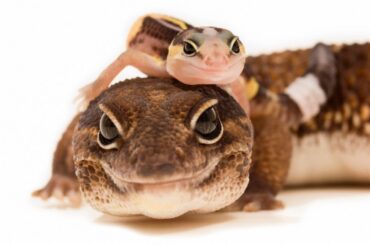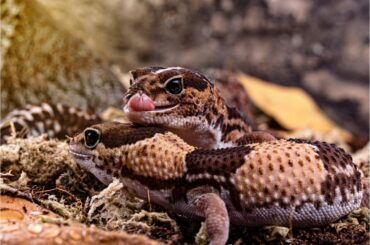Have you ever thought about what the strange sounds your crested gecko makes mean? Crested geckos are small and have a unique way of talking to each other through sound. This piece will explain crested gecko sounds and show how understanding them can help you deeply connect with these fascinating animals.
Crested geckos are very good at talking through sound. They don’t bark or meow; they click, chirp, and squeak. Gecko owners can tell if their pets are happy, stressed, or wanting attention by the sounds they make. Reading your crested gecko’s sounds helps you care for and get close to it, just like with dogs and cats.
Crested Gecko Noises and Meanings
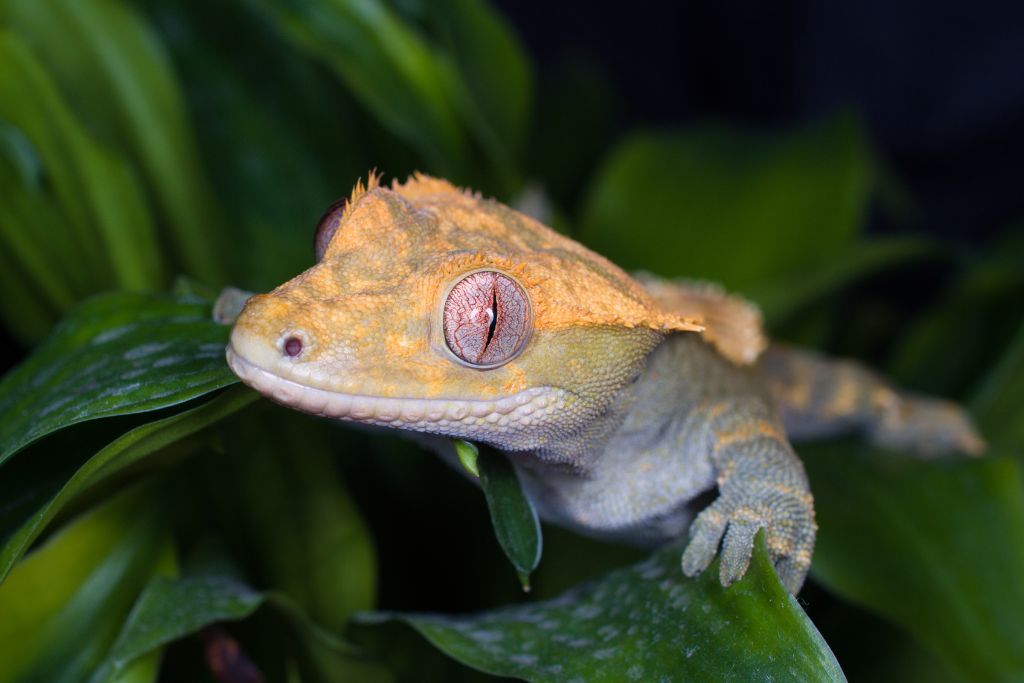
Crested geckos have a very interesting set of sounds. They chirp often when they are happy or interested in something around them. Clicks that are timed can also mean happiness and calmness. These strange sounds can tell you much about your gecko’s health and mood. Learning their language can help you connect with them.
Unlike people, crested geckos can only make certain sounds because of how their vocal cords are built. The sonic repertory is unique yet constrained by these limits. This is crucial to comprehending their communication. While not as expressive as other dogs, their gentle vocalizations enrich your relationship.
Cracking crested gecko noises let you know how they’re feeling and what they’re doing. Every sound can mean happiness, attention, or pain. Knowing these signs lets you ensure your gecko stays safe and happy. It’s a unique way to talk that goes beyond body language and helps you get to know someone better.
Hissing: Unsettled or Defensive Behavior
You might have been surprised if your crested gecko hissed. One thing that makes the hiss sound unique is the harsh, constant exhalation. If your gecko is hissing, it means it is angry or guarded, not happy. This sound lets you know that your gecko is scared or stressed. Understanding why your pet is hissing will help it feel safe and at ease.
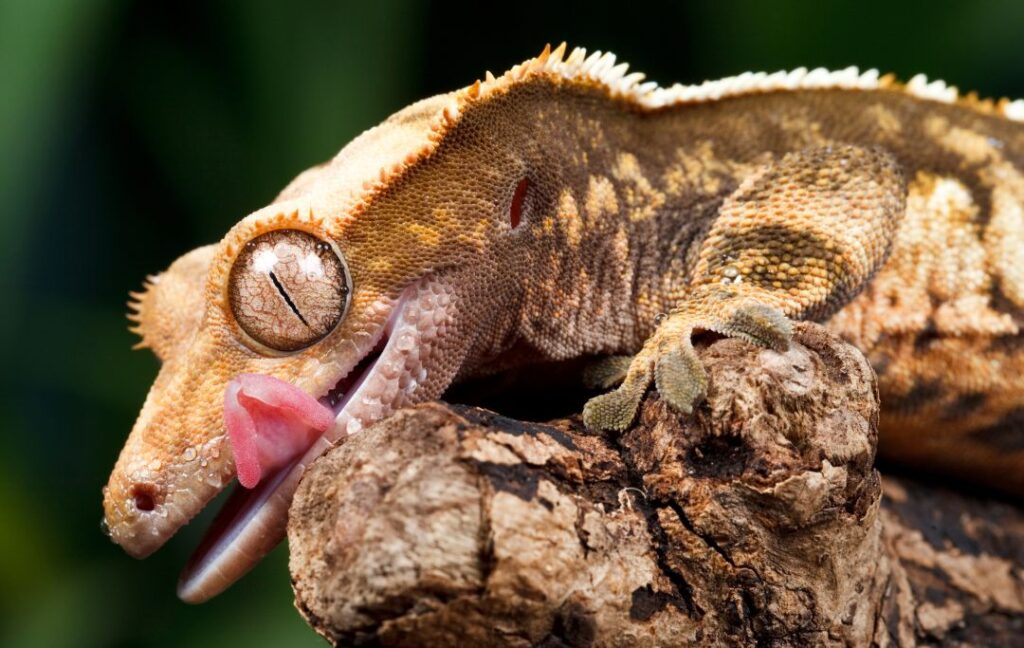
When they feel attacked or trapped, crested geckos hiss. This means, “I’m uncomfortable right now and need some space.” This defensive move is natural to keep predators away. For your gecko to calm down, give it some time.
Finding what’s making your pet tense, like loud noises, fast movements, or changes in the surroundings, might help them calm down. You can make your crested gecko feel safe and secure by giving it a stress-free space and knowing its boundaries.
Common Triggers for Hissing
It’s helpful to know when crested geckos hiss before discussing the most common reasons they do it. Hissing could mean that your gecko is scared or stressed. Let’s look at some things that make these fantastic animals hiss.
- Sudden Movements: If you move quickly or without warning around your crested gecko, it might get scared and hiss in defense.
- Loud Noises: Crested geckos hiss in response to abrupt, loud stimuli because they are sensitive to sound, and it causes them stress.
- Handling Stress: Certain geckos might get stressed when touched, especially if they are not used to it. In this case, hissing means that the person needs to be handled less roughly or takes a break from handling.
Chirping: Courtship and Mating Behavior
A crested gecko’s home may be filled with the sound of a male singing a love song. When a male crested gecko is courting, he chirps. This sound, a string of short, fast chirps, determines how old a gecko is.
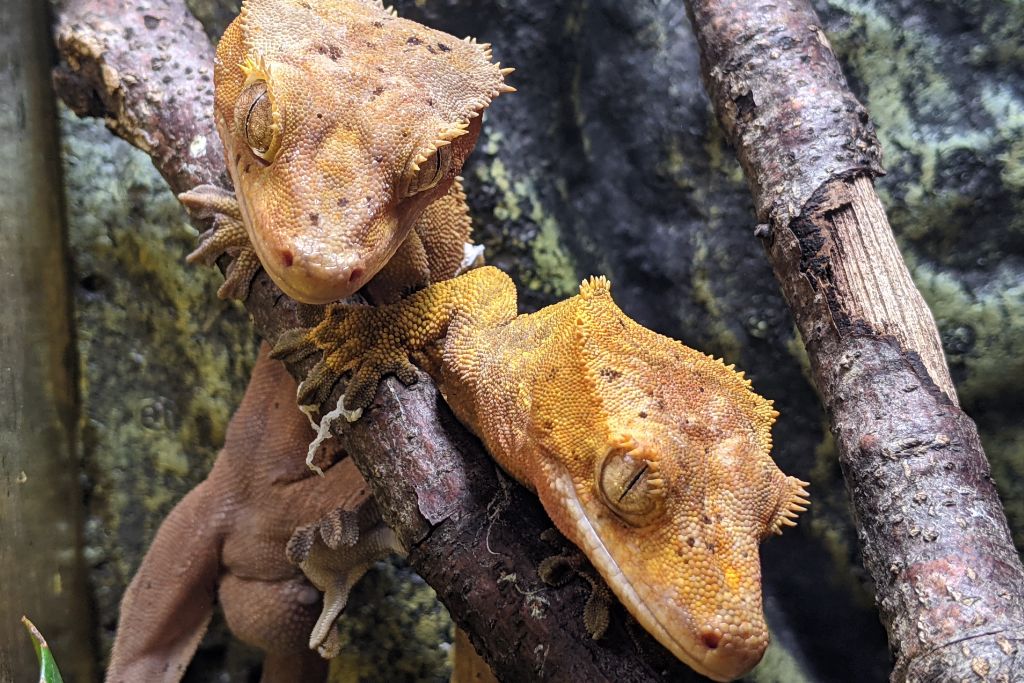
Crested geckos males court females by making complicated chirping sounds. Potential mates can tell that the male is ready to mate by the repeated chirps he makes. Males chirp to show that they are in charge of their area and to attract females. Figuring out how crested geckos’s court adds a sweet touch.
You might be interested in how these beautiful songs make the female crested geckos feel. Female geckos may reply or make noise. These soft clicks and chirps could mean that they want to mate.
These movements show how crested geckos interact with each other and how they show affection and form relationships while they are courting. When you hear that steady singing, remember that two crested geckos are in love.
Clicking: Hunting and Predatory Instincts
Imagine hearing clicking sounds from your crested gecko’s cage on a quiet night. These sounds are very important to their ability to hunt and be predators. When crested geckos are hunting, they learn to make clicking sounds that fit their senses.
Crested geckos talk to their prey by clicking a secret language. Geckos use short, regular clicks to get insects to come to them. They click like bugs to trick their prey. This behavior shows how smart and flexible crested geckos are in the wild.
To keep crested geckos in a healthy habitat, you must know how clicking affects their ability to hunt and eat. In captivity, where they might not have as many chances to hunt, enrichment activities that satisfy their natural hunting desires are very important. This could include live food or feeding the animal itself.
Barking: Threatened and Stressed
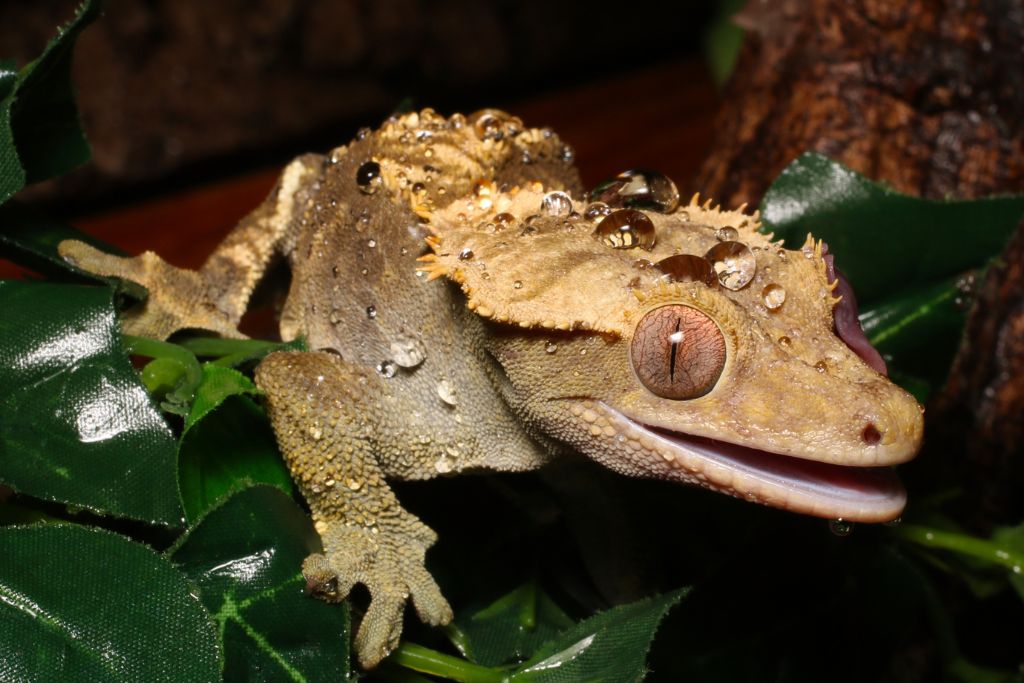
When it’s time to hunt, a crested gecko clicks, but when things get serious, it barks. Geckoes use barking more seriously than clicking to talk to each other. Figuring out this split helps us figure out how these interesting species feel.
Crested geckos bark when they feel frightened or stressed. Barking is a very clear alarm sound; barking scares away threats, unlike hunting clicks. Animals often take a protective stance for this sound by puffing up or showing their bright colors.
Recognizing and respecting these signs will help you keep your crested gecko safe and protected. When your gecko barks, they’re stressed out and need a break.
Common Triggers for Barking
Remember that barking indicates extreme distress before discussing crested geckos’ common barking triggers. Barking requires immediate attention or resolution, unlike hunting or wooing clicks. Here are some reasons your crested gecko may bark and what it means:
- Unwanted Disturbance: When geckos feel threatened, sudden or unexpected changes in their surroundings, like loud noises or sudden movements, can make them bark.
- Territorial Disputes: Crested geckos can be territorial, and if they get into a fight with another gecko in a shared area, they may bark to set limits and protect their territory.
- Handling Stress: Like people, different geckos have different amounts of comfort with being handled. Barking during or after being handled can be a sign of stress, so giving your pet a safe and calm place to calm down is essential.
Screaming: Scared and Threatened
Crested geckos that are younger may be more scared than adults. They sometimes yell, especially in a strange place or when someone is trying to hurt them. It’s scary, but this is normal for them when they are young.
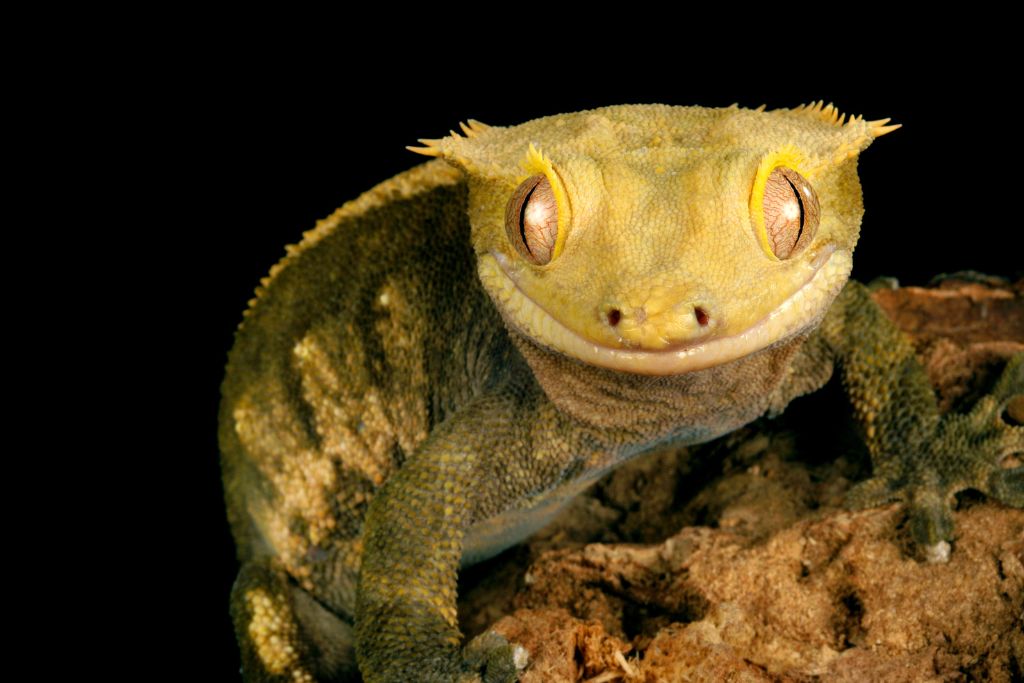
Luckily, crested geckos stop screaming as they grow and get used to their surroundings. This is normal as they get used to the area and feel safe. Your young crested gecko will grow and do well if you are always there for it and give it a nice, interesting place to live.
Common Triggers for Screaming
Screaming in crested geckos is more common in juveniles and is often a response to fear or threat. Knowing what makes young geckos scream can help create a supportive environment. Let’s look at why juvenile crested geckos scream and what they mean:
- Handling Anxiety: Young geckos may scream when they are touched because they are not used to people. This means they are scared or uncomfortable; you may need to touch them gently and slowly to calm them down.
- Territorial Disputes: Geckos that live together may scream when they want to defend their territory or think someone is trying to hurt them. Enough space and places to hide can help keep fights from happening.
- Sudden Changes: Changes in lighting, temperature, or the layout of the cage can make animals scream and hurt. Habitat changes happen slowly; routines can help calm these feelings and provide safety.
Crested Gecko Happy Noises
Like people, crested geckos share happiness in their manner. These cute reptiles share their excitement and contentment through chirping and squeaking. Learn the language of crested gecko happy noises and enjoy these times.
Chirping and Squeaking
The lovely sound of your crested gecko singing or squeaking means it is happy and content. These sounds are little chirps or high-pitched squeaks that may sound like birds talking.
These happy sounds are made by crested geckos when they are exploring their surroundings, playing with enrichment items, or eating. These sounds will help you better bond with your crested gecko and make taking care of them more fun.
Responding to Crested Gecko Noise
You must pay attention to its sounds to get close to and understand your crested gecko. These sounds show you how your gecko feels and what it needs. To make a happy, healthy space, listen to their sounds.
When reacting to gecko sounds, it’s essential to know what’s going on around you. For example, a gecko that chirps or squeaks is happy. You can strengthen your bond with your pet by gently giving it treats or interacting with it. But if your gecko hisses or barks, provide it with space and see if it’s stressed.
By carefully responding to your crested gecko’s vocal cues, you improve their quality of life and build a relationship with them based on trust and understanding.
Conclusion
Listening to your crested gecko helps you bond with it and keeps it healthy. Their feelings and wants might be clear from the sounds they make. Each chirp, click, or strange scream tells you something about your gecko’s world so you can act wisely and make its home safe and happy.
FAQs
Why is My Crested Gecko Making Noises?
Your crested gecko uses sounds to show how it feels and what it needs. For example, it will chirp when happy and hiss when scared or threatened.
What Does It Mean When a Crested Gecko Croaks?
When a crested gecko croaks, it usually means it is upset or uncomfortable. It could also mean it feels threatened or anxious in its surroundings.

